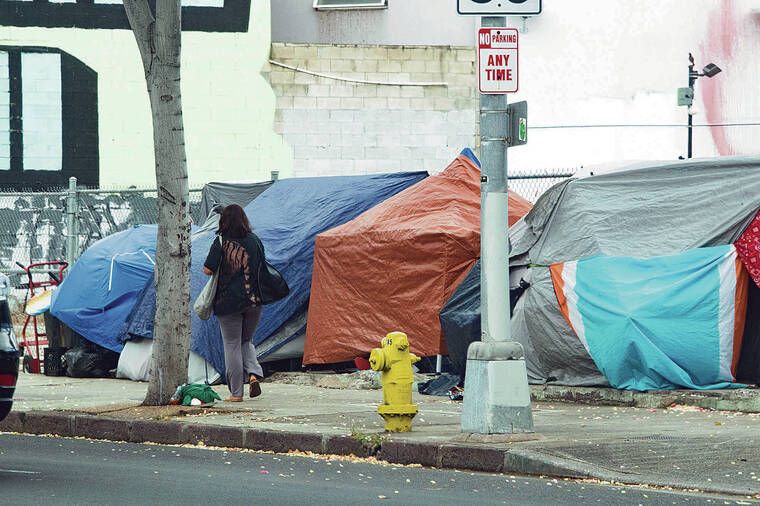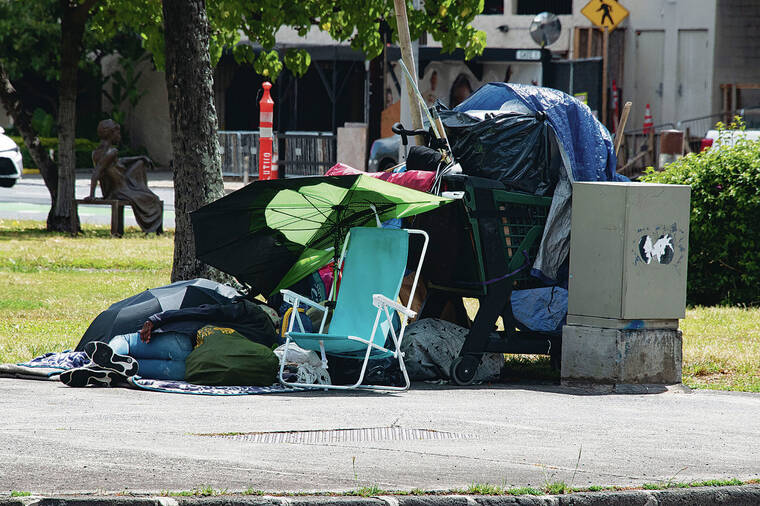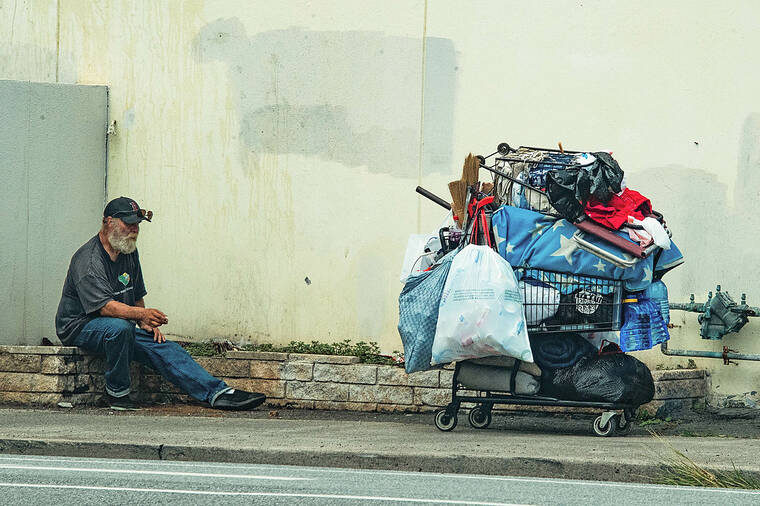Supreme Court upholds ban on sleeping outdoors in homelessness case

CRAIG T. KOJIMA / CKOJIMA@STARADVERTISER.COM
A pedestrian walks past tents along King Street near Kalakaua Avenue.

CRAIG T. KOJIMA / CKOJIMA@STARADVERTISER.COM
A homeless tent is seen on King Street and Ward Avenue.

CRAIG T. KOJIMA / CKOJIMA@STARADVERTISER.COM
A man sits near a loaded shopping cart on Beretania Street near University Avenue.



WASHINGTON >> The Supreme Court on Friday upheld an Oregon city’s ban on homeless residents sleeping outdoors, a decision likely to reverberate far beyond the West Coast as cities across the country — including in Hawaii — grapple with a growing homelessness crisis.
The ruling, by a 6-3 vote, split along ideological lines. Justice Neil Gorsuch, writing for a conservative supermajority, found that the ordinances, enacted in Grants Pass, did not violate the Constitution’s prohibition on cruel and unusual punishment. The measures penalize sleeping and camping in public places, including sidewalks, streets and city parks.
Those ordinances, Gorsuch wrote, did not criminalize the homeless, but rather the act of camping outdoors.
“It makes no difference whether the charged defendant is currently a person experiencing homelessness, a backpacker on vacation or a student who abandons his dorm room to camp out in protest on the lawn of a municipal building,” he wrote.
In her dissent, Justice Sonia Sotomayor, joined by Justices Elena Kagan and Ketanji Brown Jackson, wrote that the decision would leave society’s most vulnerable with fewer protections.
“Sleep is a biological necessity, not a crime,” Sotomayor wrote. “For some people, sleeping outside is their only option.”
Don't miss out on what's happening!
Stay in touch with breaking news, as it happens, conveniently in your email inbox. It's FREE!
That the local laws impose fines and potential jail time for people “sleeping anywhere in public at any time, including in their cars, if they use as little as a blanket to keep warm or a rolled-up shirt as a pillow” effectively punishes people for being homeless, she wrote.
“That is unconscionable and unconstitutional,” Sotomayor said in reading her dissent from the bench, a rare move that signals profound disagreement.
(Honolulu Mayor Rick Blangiardi on Friday said the Supreme Court’s ruling was “exactly what we hoped would happen. … This is a favorable ruling for the cities.”
He told the Honolulu Star-Advertiser that he sympathizes with the plight of chronically homeless people, especially those suffering from mental health issues, but said the general public needs to feel safe, as well.
“We need to make the streets safe for everybody,” Blangiardi said.
He and Gov. Josh Green continue to work on finding city and state solutions to reduce homelessness, including a new kauhale to be announced next week in and around the downtown First Hawaiian Bank building. It will include 30 outside tiny homes and 30 beds inside where all of the homeless residents can get help from a “fully staffed medical team.”
It will be followed by 100 more beds in the Iwilei Center, Blangiardi said.
But the American Civil Liberties Union of Hawaii is “very disappointed” by the Supreme Court’s decision, said ACLU Hawaii legal director Wookie Kim.
“The ruling makes it even easier for cities and counties to continue the failed approach of using, and spending money on, criminal enforcement and punishment to address our affordable housing and houselessness crises,” Kim told the Star-Advertiser.
The ruling comes before an ACLU Hawaii lawsuit Opens in a new tab against the City and County of Honolulu goes to trial in October. In July the ACLU, along with civil rights law firm Goldstein, Borgen, Dardarian & Ho, filed the suit alleging that the city’s homeless sweeps and “anti-houseless” laws are unconstitutional under Hawaii’s state constitutional prohibitions against cruel and unusual punishment.
Kim said the Supreme Court’s ruling does not have a direct legal impact on the ACLU’s lawsuit, because the Supreme Court ruled on an interpretation of the U.S. Constitution, while the ACLU’s lawsuit was brought under the state constitution.
“It’s respecting our principles of federalism,” Kim said. “The Hawaii Supreme Court has, in various areas of the law, concluded that the Hawaii Constitution is actually more protective than the U.S. Constitution. Typically, U.S. constitutional rulings set a floor, but state Supreme Courts can set a higher floor, and that’s why we don’t think this has any direct legal impact.” )
Western states react
The decision was greeted with mixed reactions among leaders in Western states, particularly in California, where increasingly visible encampments in major cities have put political pressure on governments to act.
California Gov. Gavin Newsom, a Democrat, who had urged the justices to take up the case, welcomed the ruling, acknowledging the competing demands for greater enforcement of encampments with concerns about the treatment of vulnerable people.
Even as the decision “removes the legal ambiguities that have tied the hands of local officials for years,” he said, the state will “continue to work with compassion to provide individuals experiencing homelessness with the resources they need to better their lives.”
Los Angeles Mayor Karen Bass, who has worked aggressively to bring the city’s homeless people indoors and into treatment and housing services, expressed disappointment in the ruling but vowed to continue the city’s push for housing and supportive services.
Lawmakers in Western states had pointed to a crucial appeals court ruling in 2018 that they say has tied their hands from clearing encampments.
That decision, by the 9th U.S. Circuit Court of Appeals, which covers many Western states, declared it cruel and unusual punishment for cities and states to penalize someone for sleeping outdoors if no shelter beds were available.
In California alone, 171,000 people were recently estimated to be homeless, nearly one-third of the country’s homeless population and 40,000 more than six years before. Tents and encampments are common in many parts of the state.
Oregon ordinance
The dispute arose from Grants Pass, a city of about 40,000 in the foothills of southern Oregon. After residents complained of people sleeping in alleyways and property damage downtown, city leaders enforced a series of local ordinances that banned sleeping in public spaces. The city had no homeless shelter, aside from one run by a religious organization that required, among other rules, attendance at Christian services.
A group of homeless residents sued the city, challenging the ordinances and contending that the local laws essentially criminalized homelessness.
A federal judge temporarily sided with the homeless plaintiffs, finding the city had no shelter that met the requirement from the 2018 decision.
A divided three-judge panel of the 9th Circuit appeals court upheld the lower court, and the city asked the Supreme Court to weigh in.
The Supreme Court’s majority found that the ordinances in Grants Pass were not unusual because cities and states across the country have long imposed similar penalties. Under the laws, the city issues a limited fine for a first offense, a temporary order banning camping in the parks for repeated offenses and a maximum of 30 days in jail for violating such an order.
In his opinion, Gorsuch asserted that the public camping laws applied equally to everyone and therefore did not target homeless people.
The 9th Circuit ruling that laid the groundwork for the Grants Pass case was undoubtedly well intended, he wrote, but it established a legal test that proved unworkable for the cities and states governed by it. “Issued by federal courts removed from realities on the ground, those rules have produced confusion,” Gorsuch wrote.
Gorsuch, whose family roots are in Colorado and who served as a federal appeals judge in Denver, infused the decision with a viewpoint from the West.
Homelessness in the United States has reached its highest levels since the federal government began reporting data in 2007. The five states with the highest rates of homelessness — California, Oregon, Hawaii, Arizona and Nevada — are all in the West, he wrote.
———
Story by Abbie VanSickle of the New York Times and Star-Advertiser reporter Kacie Yamamoto.
© 2024 The New York Times Company



